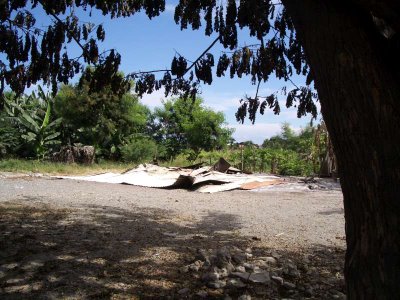At 3am this morning we were woken with a start as the text messages I had received twelve hours ago from the Australian Embassy finally came through on Daniel’s mobile phone. For the second time, I said to Daniel, better late than never!
We were finding it very difficult to sleep as our minds and bodies were understandably, stressed by the previous days events. We finally got up and sat on the veranda where the cool morning air was goddess-sent.
Daniel called “our” family and spoke to Senyor Raphael. He was still on his own protecting the three houses (ours, theirs and their slowly being-built new home) as the rest of the family had decamped to the airport next door. He thought the main road might be open again but wasn’t entirely sure. Daniel told him that we were going to try and come home.
Our colleague lives with two of her cousins and one of them, Timor’s weightlifting Para-Olympic champion (he came third at the ASEAN games in Vietnam), had arranged for us to be taken home in his neighbour’s taxi. The driver had been out on the road early this morning and said that despite being quiet, everything looked fine and that the road to Tasi Tolu was open again. We said our farewells and told our colleague we would text her once (if!) we arrived home.
The roads indeed were very quiet, but thankfully there was no signs of any damage to houses or shops along the way. Thinking that things were looking good, we rounded the airport roundabout a kilometre or two before the little street down to our home. Our taxi was greeted by a military roadblock manned with half a dozen F-FDTL (army) fully armed soldiers, one with a rather large automatic machine gun pointed towards us. We got the message we should probably stop. There was also a middle aged man sitting on the road with his hands tied behind his back. They motioned for us to keep going around the roundabout back to town. We assumed they were the currently employed mob of F-FDTL and not the recently sacked ‘591’ mob who had been demonstrating all week.
The driver stopped the car and Daniel got out to ask the soldiers whether we could return home. They said he would need to talk to their commander who was currently on his mobile phone speaking Portuguese to someone at the PNTL (police) to get them to come and take away the suspect. The taxi pulled up under a tree while we waited for Daniel to have his hearing with the commander. We waited for some minutes while the driver and our colleague’s cousin grew more and more edgy. Daniel was still waiting when the cousin said it would probably be best if I got out so they could return home. I paid the driver $2 and got out of the car just as Daniel was given permission by the commander to return home in the taxi. Daniel was confused and asked where the taxi had gone and I said, home!
The commander initially told Daniel that the situation was still bad and we couldn't go past. Daniel talked about needing our passports and other important documents and that we had talked with “our” family and he said the area was peaceful. Eventually the commander jumped in a car with three armed soldiers and went ahead, telling us we could walk back to our home. So we walked down the main road towards Rai Kotu and on the way passed the coffee stalls which had been trashed, many bags of coffee broken and spread over the ground, others intact. One house had been completely burned and was just a still-warm collapsed shell. Even though we see many burned out houses every day it is slightly scary to see one still smoking. Although it is the people of the west who grow the coffee, apparently these sellers were all from the east, hence they were targeted by the marauding youths.
It was a bit nerve racking to walk down the road as there were very few people about. There were piles of ashes and remnants from tyres that had been set on fire on the road. The small dirt roads that lead off towards the beach were blocked by long steel poles. When we finally reached the first of the two roads that lead down to our house, we were greeted by another military checkpoint, however this young man didn't seem very interested in us. As we walked down our road we were greeted by two soldiers with automatic weapons and a group of our neighbours all huddled together along with a car packed to the rafters. We greeted the soldiers and explained that their commander had allowed us to return home. One of the soldiers was especially friendly and shook both our hands while explaining that he was trying to convince our neighbours to stay put and not to flee as there was no need to. I think they thought it was good for their community relations exercise that the
malae were returning home. We greeted all of our neighbours that we saw warmly and were greeted warmly in return.
Apart from a truck with two young men hoping to get in and leave the neighbourhood, there weren’t any other people in sight. Our neighbourhood is normally a bustling hive of activity with tens of children and their parents on the street. It felt very strange as if all of a sudden the place had become a ghost town. House after house was closed and bordered up, their occupants having either fled to the airport, the hills of Dili or back to their respective districts.
As we turned the bend of our street for the final leg of the journey to our house, again, there was deathly silence as not a soul was about. We approached “our” family’s house and called out to Senyor Raphael who soon appeared. He seemed happy to see us again and gave us more details as to what had happened since yesterday.
When the demonstration turned violent outside the government building, some of the ‘591’ and gangs of youths returned to Tasi Tolu where mayhem ensued. Some attacked the coffee sellers we had passed on the road and then proceeded to attack store holders in Tasi Tolu. The communities of Rai Kotu and Tasi Tolu soon starting fleeing en masse, particularly when they began hearing gun fire. Most of our immediate neighbours had fled including our
ema boot (big/important people) next door neighbours who had returned to the districts. “Our” family along with the hundreds or thousands who had fled to the airport were being moved to Don Bosco, a Catholic mission further up the road towards the hills. Senyor said that our passports, money and laptop were with his family anticipating we would need them in case we were evacuated. We thanked him for being so considerate but began to wonder how we would retrieve them if we indeed needed them! We also cursed the fact that we didn’t have the laptop on which to write blog posts and to watch DVDs!
We spent the whole day indoors, tense while listening to Radio Australia who kept repeating the same story about Timor over and over again until the afternoon. We learnt that two people had died: both civilians who were killed by shop owners defending their property, and upwards of forty people were injured. These figures were much less than the various ones we had heard on the rumour mill train of Dili. After three hours of just sitting and listening to the radio, I decided to see if I could read a book instead and began reading
Menagerie 4, a collection of literary work by Balinese and Indonesian writers. At various times throughout the course of the day we heard noises that sounded like gun fire but we couldn’t be sure over the din of the overhead fan and stand alone fan, both of which were on full blast to cool our overheated bodies.
Mid afternoon, Atoby, the fourth child of “our” family returned home along with two teenage boys who live opposite and who are related. Senyor said that he wanted to be with his dad while the rest of the family had been moved to Don Bosco. We continued to read, listen to the radio for any updates, and snooze fitfully.
Not long before sunset, the rest of “our” family began returning home in small groups with our belongings. We were happy to see them safe and well and to have back our laptop. Daniel soon typed up some notes for blog posts.
That night was watched the evening news and were amused to discover that the commander whom Daniel had to seek permission from to return home, was in fact the F-FDTL Chief of Staff, Lieutenant Colonel Lere Anan Timor, the highest ranking military man currently in the country! We also learnt that the F-FDTL had taken control of the airport, Rai Kotu and Tasi Tolu while the PNTL (police) were in control of the rest of Dili. If gunshots were heard, it was in all probability just the F-FDTL firing into the air. Xanana had visited all the major refugee sites within Dili to talk to the people gathered there, to answer their questions and to persuade them to return home and be calm. Ramos-Horta asked Timor's journalists to give the message to the community that it should stay calm and not panic; they had a responsibility not to spread panic or make things worse.
That evening we watched a DVD called
Kinky Boots, a delightful British comedy that made us forget momentarily where we were. It was inspired by the true story of a traditional English men's footwear factory in Northamptonshire which turned to production of kinky boots for transvestites in order to save the ailing family business and safeguard the jobs of the local community.
We again found it difficult to sleep as we didn’t know if anything was going to happen or not.
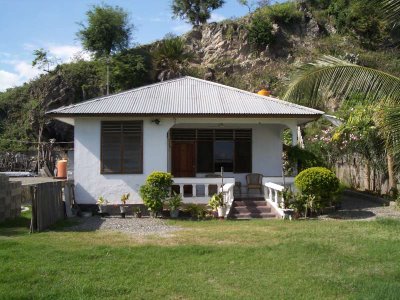 Our home in Rai Kotu
Our home in Rai Kotu 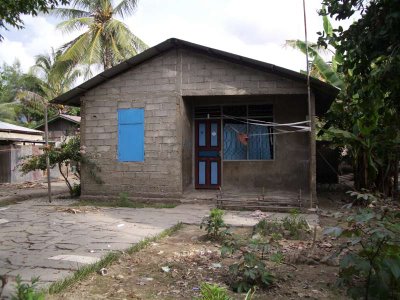 A neighbour's empty home, normally alive with children and adults
A neighbour's empty home, normally alive with children and adults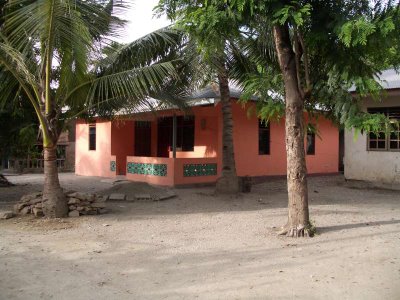 One of the more colourful homes in our neighbourhood vacated by its occupants
One of the more colourful homes in our neighbourhood vacated by its occupants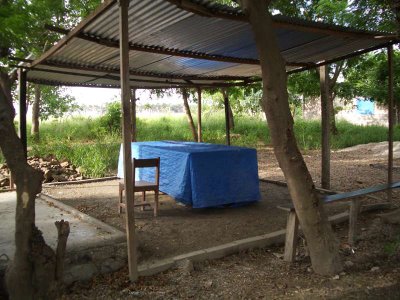 This pool table is normally surrounded by young men playing a game, today it sits in silence
This pool table is normally surrounded by young men playing a game, today it sits in silence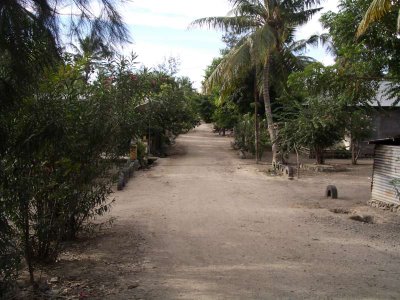 Our deserted street in Rai Kotu, normally bustling with human and animal activity
Our deserted street in Rai Kotu, normally bustling with human and animal activity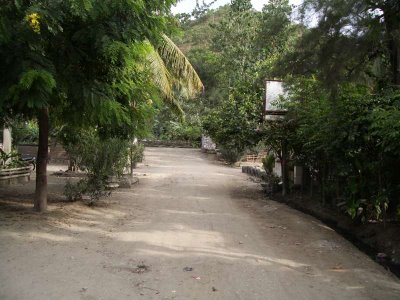 Our empty street
Our empty street 


